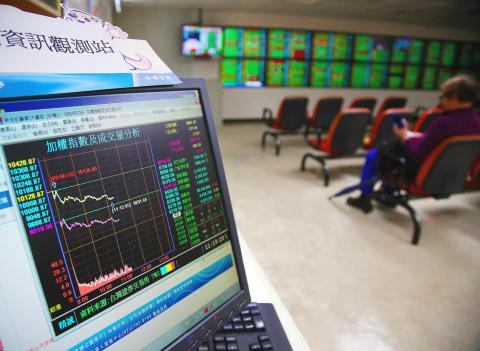The TAIEX yesterday closed below 10,000 points for the first time in 13 months, plunging 20 percent from its peak in January, reflecting rising concerns over the COVID-19 pandemic, which has prompted several central banks to announce interest rate cuts.
The index dove 4.06 percent to close at 9,717.77, the first time it has closed below 10,000 points since it closed at 9,932 on Jan. 30 last year, Taiwan Stock Exchange data showed.
Turnover on the main board was NT$209.379 billion (US$6.93 billion), with foreign institutional investors selling a net NT$33.35 billion in local shares, the data showed.

Photo: CNA
Analysts attributed the decline to investor concerns over the US Federal Reserve on Sunday slashing rates by a full percentage point, four times its usual range.
“Theoretically, the rate cut should have soothed market sentiment, but it instead it made investors feel anxious and presume that the situation was so bad that the Fed needed to conduct a larger-than-expected reduction,” Capital Investment Trust Corp (群益投信) fund manager Daniel Tsai (蔡彥正) told the Taipei Times by telephone.
Investors had also turned conservative over Taiwanese companies after Apple Inc delayed the release of its 5G iPhone due to the pandemic, with the delay to weaken momentum for the nation’s iPhone suppliers, while plummeting crude oil prices weigh on local petrochemical firms, Tsai said.
Smartphone camera lens maker Largan Precision Co’s (大立光) shares dipped 8.25 percent to NT$3,725, while shares of Hon Hai Precision Industry Co (鴻海精密), the world’s largest contract electronics maker, sank 4.69 percent to NT$71.1 on the Taiwan Stock Exchange.
Formosa Petrochemical Corp (台塑石化) shares dropped 3.98 percent to NT$70 and Formosa Plastics Corp (台灣塑膠) declined 2.98 percent to NT$78.2.
The TAIEX has dropped significantly from its 30-year high of 12,179 points on Jan. 14, which is an omen that should not be ignored, analysts said.
“Although a drop of 20 percent or more is usually considered a sign of the market turning bearish, we need to wait to see if Taiwan’s equity market has ended a bull run,” Hua Nan Securities Investment Management Co (華南投顧) chairman David Chu (儲祥生) said by telephone.
“Bearish or not, you can say that the local market is going through a difficult time. Global and domestic consumption would be weakened by the continued spread of the virus, travel bans and the cancelation of sports events,” Chu said.
Even with Taiwan’s central bank expected to cut interest rates at its quarterly board meeting on Thursday, it is not likely to boost the TAIEX much, as people would not increase their investments or consumption just because of a rate cut, he said.
“People are eager to know when the outbreak would be contained, but a rate cut will not provide an answer,” Chu said.

The demise of the coal industry left the US’ Appalachian region in tatters, with lost jobs, spoiled water and countless kilometers of abandoned underground mines. Now entrepreneurs are eyeing the rural region with ambitious visions to rebuild its economy by converting old mines into solar power systems and data centers that could help fuel the increasing power demands of the artificial intelligence (AI) boom. One such project is underway by a non-profit team calling itself Energy DELTA (Discovery, Education, Learning and Technology Accelerator) Lab, which is looking to develop energy sources on about 26,305 hectares of old coal land in

Taiwan’s exports soared 56 percent year-on-year to an all-time high of US$64.05 billion last month, propelled by surging global demand for artificial intelligence (AI), high-performance computing and cloud service infrastructure, the Ministry of Finance said yesterday. Department of Statistics Director-General Beatrice Tsai (蔡美娜) called the figure an unexpected upside surprise, citing a wave of technology orders from overseas customers alongside the usual year-end shopping season for technology products. Growth is likely to remain strong this month, she said, projecting a 40 percent to 45 percent expansion on an annual basis. The outperformance could prompt the Directorate-General of Budget, Accounting and

Netflix on Friday faced fierce criticism over its blockbuster deal to acquire Warner Bros Discovery. The streaming giant is already viewed as a pariah in some Hollywood circles, largely due to its reluctance to release content in theaters and its disruption of traditional industry practices. As Netflix emerged as the likely winning bidder for Warner Bros — the studio behind Casablanca, the Harry Potter movies and Friends — Hollywood’s elite launched an aggressive campaign against the acquisition. Titanic director James Cameron called the buyout a “disaster,” while a group of prominent producers are lobbying US Congress to oppose the deal,

Two Chinese chipmakers are attracting strong retail investor demand, buoyed by industry peer Moore Threads Technology Co’s (摩爾線程) stellar debut. The retail portion of MetaX Integrated Circuits (Shanghai) Co’s (上海沐曦) upcoming initial public offering (IPO) was 2,986 times oversubscribed on Friday, according to a filing. Meanwhile, Beijing Onmicro Electronics Co (北京昂瑞微), which makes radio frequency chips, was 2,899 times oversubscribed on Friday, its filing showed. The bids coincided with Moore Threads’ trading debut, which surged 425 percent on Friday after raising 8 billion yuan (US$1.13 billion) on bets that the company could emerge as a viable local competitor to Nvidia